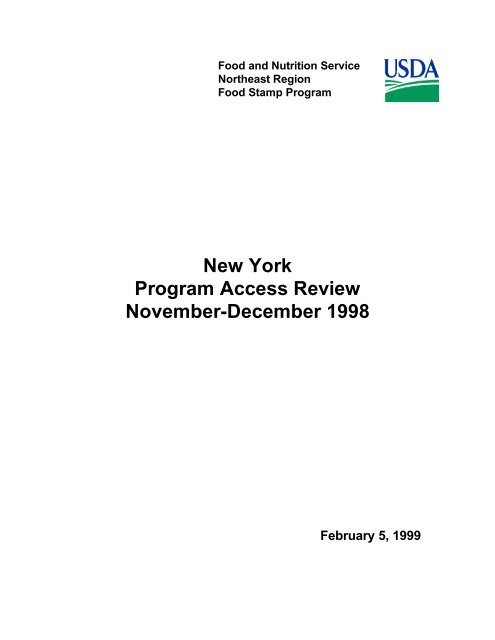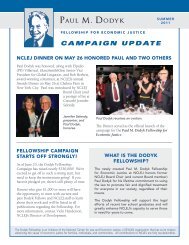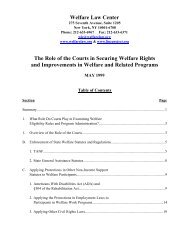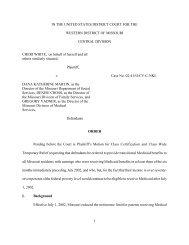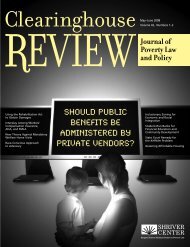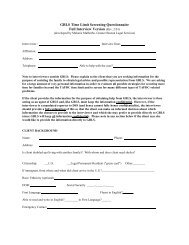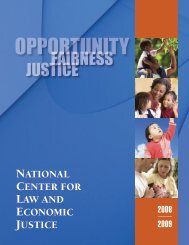New York Program Access Review
New York Program Access Review
New York Program Access Review
You also want an ePaper? Increase the reach of your titles
YUMPU automatically turns print PDFs into web optimized ePapers that Google loves.
Food and Nutrition ServiceNortheast RegionFood Stamp <strong>Program</strong><strong>New</strong> <strong>York</strong><strong>Program</strong> <strong>Access</strong> <strong>Review</strong>November-December 1998February 5, 1999
NEW YORK PROGRAM ACCESS REVIEWNOVEMBER-DECEMBER 1998The <strong>New</strong> <strong>York</strong> State Department of Family Assistance, Office of Temporary andDisability Assistance (OTDA) administers the Food Stamp <strong>Program</strong> in <strong>New</strong> <strong>York</strong>State under an agreement with the USDA Food and Nutrition Service (FNS).OTDA supervises the local administration of the Food Stamp <strong>Program</strong> through58 social service districts, including <strong>New</strong> <strong>York</strong> City’s Human ResourcesAdministration (HRA). OTDA is ultimately responsible for ensuring statewidecompliance with all pertinent Federal statutes, regulations and guidance issuedby FNS.The FNS Northeast Regional Office recently reviewed local policies andprocedures affecting access to the Food Stamp <strong>Program</strong> in <strong>New</strong> <strong>York</strong> City. Thisreview was part of FNS’ ongoing responsibility to ensure compliance by Statesand local districts with all applicable Food Stamp <strong>Program</strong> laws and regulations.The Personal Responsibility and Work Opportunity Reconciliation Act of 1996(PRWORA) provided increased flexibility to States in matters affecting localFood Stamp <strong>Program</strong> operations. However, Section 4 of the Food Stamp Act of1977, as amended, (FSA) authorizes the Secretary of Agriculture “…to formulateand administer a Food Stamp <strong>Program</strong> under which, at the request of the Stateagency, eligible households within the State shall be provided with anopportunity to obtain a more nutritious diet... .” This construction of the FoodStamp <strong>Program</strong> clearly gives primary responsibility to the Secretary ofAgriculture to manage this national nutrition assistance program.In passing PRWORA, Congress thoroughly reviewed the FSA and madechanges to many of its provisions. However, it also made conscious decisionsto retain certain requirements. Soon after PRWORA was signed into law, FNSissued implementing memoranda to all State commissioners clarifying therequirements of the FSA, as amended by PRWORA. These memoranda alsospecified deadlines for implementation of new statutory provisions. State2
NEW YORK PROGRAM ACCESS REVIEWNOVEMBER-DECEMBER 1998agencies were required to continue to comply with all regulatory provisions thatwere unchanged by PRWORA.In PRWORA, Congress spoke clearly of its expectations regarding food stampapplication processing standards. Section 835 of PRWORA made it clear thatthe Food Stamp <strong>Program</strong> would continue to have a distinct set of nationwideapplication rights and responsibilities.While PRWORA amended Section 11(e) of the FSA to increase State flexibilitywith respect to the operation of food stamp offices, it did not change applicants’basic right to apply immediately for food stamp benefits. In fact, PRWORArecodified this right, along with a new emphasis on timely and fair service toapplicants. The FSA retains the provision that the State agency shall permit anapplicant household to apply to participate in the Food Stamp <strong>Program</strong> on thesame day that the household first contacts a food stamp office in person duringoffice hours. It also provides that all States shall consider an application thatcontains the name, address, and signature of the applicant to be filed on thedate the applicant submits the application. PRWORA amended the FSA topermit State agencies to develop their own application, but the application mustcontain the information necessary to determine eligibility under the provisions ofthe FSA. The food stamp application must activate all of the rights,responsibilities, and protections provided a Food Stamp <strong>Program</strong> applicantunder Federal law and regulations.Where the FSA was unchanged, current food stamp regulations remain in effect.For example, the regulations at 7 CFR 273.2(c)(1) provide that each householdhas the right to file an application on the same day it contacts the food stampoffice during office hours. The State must advise the household that it does nothave to be interviewed before filing the application and may file an incomplete3
NEW YORK PROGRAM ACCESS REVIEWNOVEMBER-DECEMBER 1998application as long as the applicant’s name and address are recorded on theform, which is signed by a responsible member of the household or thehousehold’s authorized representative. The regulations at 7 CFR 273.2(c)(2)provide that State agencies shall encourage households to file an applicationform the same day the household or its representative contacts the food stampoffice in person or by telephone and expresses interest in obtaining food stampassistance.The amended version of Section 11(e) of the FSA requires States to providebenefits to destitute households within seven days of the date of applicationinstead of the normal 30-day maximum processing period. Although PRWORAchanged the processing time frame for expedited service from five to sevendays, it maintained the requirement that State agencies screen all applicanthouseholds to measure their eligibility for expedited service.There have been concerns for several months regarding current Food Stamp<strong>Program</strong> application policies in <strong>New</strong> <strong>York</strong> City. OTDA did review some aspectsof HRA’s application processes earlier in 1998. It is our understanding that thisreview was limited to <strong>New</strong> <strong>York</strong> City’s policy of “protecting the application date”for purposes of determining benefits retroactive to households’ original date ofapplication. There is no indication that OTDA expanded their review to examineother questionable areas of application procedures in <strong>New</strong> <strong>York</strong> City. Thelimited scope of the OTDA review, and the apparent continuation of possiblynon-compliant certification procedures, caused FNS to undertake anindependent review of <strong>New</strong> <strong>York</strong> City operations.We selected two Job Centers, Queens #53 and Jamaica #54, and began thereview on November 9, 1998. Our review included:4
NEW YORK PROGRAM ACCESS REVIEWNOVEMBER-DECEMBER 19981. Examination of nearly 600 case files in four categories of case actions:open, closed, denied and “diverted” (withdrawn).2. Interviews with program administrators and staff.3. Interviews with program applicants who withdrew their job profiles andapplications for temporary cash assistance.4. Observation of daily operations within the two Job Centers.The results of our review are organized under the following headings:A. Impediments to timely application processing.B. Imposition of eligibility standards not authorized under the FSA.C. Lack of effective State agency oversight of local district operations.We provided a draft version of our review report to State and City officials atOTDA’s Albany office on January 11, 1999. The exit conference provided anopportunity for all parties to discuss the findings and recommendations includedin that draft report. Because of the serious nature of the findings, we asked thatthe State agency provide us with their formal comments no later thanJanuary 19, 1999. Written comments were sent to our office by facsimiletransmission on January 19. In addition, both OTDA and HRA wrote to theOffice of the Secretary of Agriculture to express their concerns regarding thereview and its findings. Throughout this report, we will make reference toOTDA’s and HRA’s comments that were made at the exit conference or in theirwritten responses.5
NEW YORK PROGRAM ACCESS REVIEWNOVEMBER-DECEMBER 1998A. Impediments to Timely Application ProcessingFINDING #1:1. The Job Centers reviewed do not permit households to apply for theFood Stamp <strong>Program</strong> on the same day the households contact the JobCenters.2. The Job Centers reviewed do not notify households of their statutoryright to file a Food Stamp <strong>Program</strong> application the same day theycontact the Job Centers.3. The Job Centers reviewed do not make Food Stamp <strong>Program</strong>applications readily accessible to potentially eligible households.4. The Job Centers reviewed encourage households to withdraw their jobprofiles (applications for temporary cash assistance) and treat this as awithdrawal of their application for Food Stamp assistance. Householdsare not told of their right to apply for Food Stamp benefits independentof other program choices.Section 11(e)(2)(B) of the FSA specifies that “the State agency shall permit anapplicant household to apply to participate in the Food Stamp <strong>Program</strong> on thesame day that the household first contacts a food stamp office in person duringoffice hours.” (7 U.S.C. 2020(e)(2)(B)). Food stamp regulations at 7 CFR273.2(c)(1) and (c)(2) confirm this and further stipulate that “State agencies shallencourage households to file an application form the same day the household orits representative contacts the food stamp office in person or by telephone....”The term “encourage” here does not mean recruitment or persuasion. It doesmean that States have a responsibility to inform individuals who express interest6
NEW YORK PROGRAM ACCESS REVIEWNOVEMBER-DECEMBER 1998in the FSP, or who have concerns about food insecurity, about the FSP and theirright to apply. Additionally, regulations at 7 CFR 273.2(c)(3) specify that “theState agency shall make application forms readily accessible to potentiallyeligible households.”The above-cited regulatory requirements guarantee the households’ rights to awide range of processing timeliness standards, required notification of caseactions taken, and fair hearing rights associated with the Food Stamp <strong>Program</strong>application process.Denial of the opportunity to timely receive and file an appropriate applicationform is, in effect, a denial of a wide range of rights afforded to applicants in lawand regulations. These rights go beyond the protection of the application datefor eventual computation of benefits retroactive to the application date. See 7CFR 273.2(g) (timeliness standards for application processing); 7 CFR273.10(g) (certification notices to households); and 7 CFR 273.15(f) (fairhearings, etc.).At the exit conference, and in subsequent correspondence, both <strong>New</strong> <strong>York</strong> CityHRA and OTDA have questioned the regulatory requirement that Statesencourage households to apply for benefits on the same day they come to alocal office. While the scope and meaning of this regulatory requirement may besubject to disagreement, there is no question regarding the intent of PRWORA’srequirement that States shall permit an applicant household to apply toparticipate in the Food Stamp <strong>Program</strong> on the same day that the household firstcontacts a food stamp office. PRWORA’s requirement that States providetimely, accurate, and fair service to applicants carries with it a responsibility thatStates inform households in a reasonable manner of their application rights.7
NEW YORK PROGRAM ACCESS REVIEWNOVEMBER-DECEMBER 1998The full impact of <strong>New</strong> <strong>York</strong> City’s policy was seen when FNS reviewersanalyzed the experience of applicant households who withdrew their job profilesor were diverted from applying for Temporary Assistance to Needy Families(TANF). Unable to file an application that would provide them with officialnotification of the disposition of their case, many households were not aware oftheir right to file an application for food stamp benefits independent of anydecision regarding their application for TANF. Neither of the Job Centersreviewed by FNS had signs or any other sources of information which explainedthe application processing standards and the right to file an application on theday of initial contact.FNS reviewers found that many clients withdrew their job profile and neverexercised their statutory right to formally apply for the Food Stamp <strong>Program</strong>.Our review of Job Center Activity Logs showed that approximately fifty percent ofthe clients on the logs had withdrawn their job profile/application for temporarycash assistance. Telephone interviews with clients revealed that clients arefrequently encouraged to withdraw their job profiles for reasons that, takenalone, would not result in a Food Stamp <strong>Program</strong> denial (e.g., the absence ofone or more adult household members at the time of the interview, or theassertion by the financial planner that the household could likely secureemployment on their own).Our interviews also indicated that many clients do not realize, and are not told,that their job profile withdrawal is being treated as a withdrawal of theirapplication for food stamp participation. By withdrawing their job profiles, manyclients appeared to unknowingly forfeit their right to apply for food stampbenefits as well as their rights to formal notification of disposition of their foodstamp application (7 CFR 273.10(g)) and their rights to a fair hearing on theaction taken on their application (7 CFR 273.15(f)).8
NEW YORK PROGRAM ACCESS REVIEWNOVEMBER-DECEMBER 1998The practice of deeming a withdrawn job profile to be a withdrawal of thehousehold’s request for food stamp assistance runs counter to the FSA, asamended by PRWORA. The FSA clearly requires that States must providetimely, accurate and fair service to applicants for, and participants in, the FoodStamp <strong>Program</strong>. One of the specific requirements associated with the timelyfiling of food stamp applications is the provision at 7 CFR 273.2 (c)(6) whichrequires States to advise applicant households of their right to reapply for foodstamp benefits at any time.Our review found that the multi-program benefit application, DSS-2921 <strong>New</strong> <strong>York</strong>City (revision 4/96), is still the required application instrument for the FSP in <strong>New</strong><strong>York</strong> City. According to page IV-F of <strong>New</strong> <strong>York</strong> State’s Food Stamp SourceBook for Regulations (in a version dated November 10, 1995, and provided tous, on request, as current in November 1998), all local districts shall use theState-prescribed DSS-2921 application form. It is the only document that cancurrently trigger the eligibility determination process through the WelfareManagement System (WMS), the automated system which supports benefitdetermination and issuance.The Participant Job Profile and Assessment Form, W-680B, does not meet thestatutory definition of a Food Stamp <strong>Program</strong> application found in PRWORA, asit does not contain all of the Food Stamp <strong>Program</strong> eligibility criteria identified inthe FSA. A wide range of informational elements are not included in the W-680B, including information on income, resources, household expenses andseveral other critical elements of eligibility.During the exit conference and in subsequent correspondence, OTDA hasindicated their intention to explore with HRA the possibility of using theParticipant Job Profile and Assessment Form as the approved application form9
NEW YORK PROGRAM ACCESS REVIEWNOVEMBER-DECEMBER 1998in <strong>New</strong> <strong>York</strong> City. Amendments to that form and its use would be required toensure that all necessary information is collected and all pertinent applicantrights are protected. Local offices must make the complete application availableto households on the same day they come to the local office. Only the completeapplication fully informs applicants about eligibility requirements. Householdsdo not have to be interviewed before filing the application and may file anincomplete application as long as the applicant’s name and address arerecorded on the form, which is signed by a responsible member of the householdor the household’s authorized representative. (Section 11(e)(2)(B)(iv)).Financial Planning Unit staff stated that applications (DSS-2921) were onlyavailable if an applicant insisted on receiving one and that, regardless of datesigned, applications would not be acted upon until the applicant reached anadvanced step in the ”financial planning/employment planning” process. TheFood Stamp <strong>Program</strong> benefit application is not given to the applicant until daytwo of the process, after the applicant begins TANF-related employmentactivities. This policy is formally stated in the “Job Center Trainee Workbook”issued by the Human Resources Administration’s Office of EmploymentServices. Our review of 108 new applicants’ cases showed that only householdsapproved for expedited processing were allowed to file an application on the daythey came to the Job Center.In correspondence received after the exit conference, OTDA indicated that theuse of the Job Profile and Assessment form “...protects the filing date forapplicants.” As stated earlier, a broad range of rights flows from the applicant’sright to file a food stamp application, not limited to the establishment of a startingpoint for computing benefits.10
NEW YORK PROGRAM ACCESS REVIEWNOVEMBER-DECEMBER 1998Our review of case information and discussions with applicant householdsshowed that applicants’ rights were often denied even when they were providedwith a job profile form. In our sample, we found 19 job profiles withdrawnbecause the applicant left the center without having the opportunity to be seenby the initial interviewer (waiting periods ranging up to six hours were cited byrespondents to our telephone survey). Twenty-four job profiles were withdrawnbecause households did not have complete documentation and verification withthem when they applied. Thirty-two job profiles were withdrawn for unknownreasons.In our sample, sixteen of the cases which were withdrawn (“losing” theirapplication date) were eventually approved for benefits at the same job center.Twenty-one of the withdrawn cases received benefits at another center. In total,thirty-seven households who withdrew their job profiles were later determined tobe in fact eligible for benefits after going through the intake process for a secondtime. No benefits were provided back to the date of the original job profile.Applicants who complete job profiles and subsequently fail to appear forscheduled interviews are also denied the process required by food stampregulations. Such cases must be notified that their applications have beendenied on the thirtieth day following the date of application. (<strong>New</strong> <strong>York</strong> Stateoperates under a waiver granted by FNS which relieves the Food Stamp office ofthe responsibility of scheduling a second interview when a household fails toappear for their first scheduled interview. This waiver does not eliminate theState’s responsibility to issue a notice of denial to such applicants no later than30 days after the date of application.)11
NEW YORK PROGRAM ACCESS REVIEWNOVEMBER-DECEMBER 1998These circumstances lead us to conclude that the current procedures associatedwith the completion of the job profile do not reliably protect the application rightsof food stamp applicant households.RECOMMENDATION #1 : OTDA must act immediately to ensure that:1. All local offices make Food Stamp <strong>Program</strong> applications readily accessible toall potentially eligible households.2. All local offices take appropriate action to timely notify all applicants of theirright to file a Food Stamp <strong>Program</strong> application on the day of their first contactwith the food stamp office.3. All local offices notify applicants of their specific rights to reapply for FoodStamp <strong>Program</strong> benefits at any time after they withdraw their currentapplication.4. All local offices process all Food Stamp <strong>Program</strong> applications, adhering to allof the timeliness standards, notice requirements, and fair hearing rightsincluded in pertinent regulations.12
NEW YORK PROGRAM ACCESS REVIEWNOVEMBER-DECEMBER 1998FINDING #2: Poor documentation made it impossible to determine if allapplicants are adequately screened for expedited service .Food stamp regulations at 7 CFR 273.2(i)(2) require that “the State agency’sapplication procedures shall be designed to identify households eligible forexpedited service at the time the household requests assistance.” Section 838of PRWORA changed the expedited service timeframe in section 11(e)(9) of theFSA from five to a maximum of seven calendar days and eliminated thehomeless category from those entitled to expedited service.We reviewed 108 new applicants’ cases to evaluate HRA’s procedures to screenhouseholds for expedited service needs. We found that inconsistentdocumentation in eligibility files made it difficult to determine if eligible applicantswere afforded an opportunity to receive expedited service.In most cases, we did see that a Form W-138T or S, “Information About AnExpedited Food Stamp Interview,” was completed. However, in many cases, thisform was not filled out thoroughly. Frequently, this screening form was not usedon the date the client first contacted the Job Center.At the exit conference, State and City officials proposed to amend screeningprocedures, such that information gathered in the course of the initial interviewprocess would be complete and better document the screening of households foreligibility for expedited service.13
NEW YORK PROGRAM ACCESS REVIEWNOVEMBER-DECEMBER 1998RECOMMENDATION #2: OTDA must take immediate action to ensure that:1. All local offices consistently screen all applicant households to determinetheir eligibility for expedited food stamp service in accordance with currentlyapplicable standards.2. All local offices document thoroughly their evaluation of each household forexpedited service eligibility.3. All local offices provide food stamp benefits no later than seven days afterthe application date for all households determined eligible for expeditedservice.14
NEW YORK PROGRAM ACCESS REVIEWNOVEMBER-DECEMBER 1998B. Imposition of Eligibility Standards Not Authorized Under the FoodStamp ActFINDING #3: The centers reviewed impose eligibility requirements thatexceed the standards set by the Food Stamp Act and regulations.Section 5(b) of the FSA states that the Secretary (of Agriculture) “shall establishuniform national standards of eligibility ...for participation by households in theFood Stamp <strong>Program</strong> ... and no State agency shall impose any other standardsof eligibility as a condition for participating in the Food Stamp <strong>Program</strong>.” (7U.S.C. 2014(b)).Our review found that households were frequently denied food stamp benefitsfor failure to participate in Eligibility Verification <strong>Review</strong> (EVR) activities oremployment related activities. We wrote to OTDA on December 16, 1997,directing that agency to immediately end the practice of denying food stampapplications based solely on failure to attend EVR interviews.At the exit conference, OTDA officials stated that they had not taken action onthis letter, citing disagreement with its contents. No formal response citing theirconcerns was received from OTDA since the issuance of FNS’ original letter.The minimum requirements of the TANF application process, as explained toFNS reviewers, entails a meeting with a financial planner, a referral and meetingwith an employment planner (which sometimes can be scheduled during the firstvisit to the job center), a separate appointment at the job center for the intakeprocess (when the Form DSS 2921 is completed), followed by two EVRappointments (one in an HRA office and one in the form of a home visit). This15
NEW YORK PROGRAM ACCESS REVIEWNOVEMBER-DECEMBER 1998procedure is required universally of all applicants. Failure to complete any ofthese five minimum steps results in the denial of TANF benefits, as well as foodstamp benefits and Medicaid assistance. When action is taken to deny allbenefits for failure to complete any one of these requirements, households arenot notified of their right to pursue their food stamp application independent oftheir TANF application.Food stamp regulations at 7 CFR 273.2 hold applicant households responsiblefor the production of documentation to verify circumstances affecting eligibility,allowing them up to ten days to provide such documentation. When applicanthouseholds provide documentation that is not questionable to support theinformation contained on their application (either at the time of application orwithin the allowable ten day period), it runs counter to the fair service provisionof PRWORA to subject such households to mandatory denial of theirapplications for failure to meet any one of the five minimum steps of the TANFapplication process. We acknowledge HRA’s desire to enhance Food Stamp<strong>Program</strong> accuracy by verifying questionable information. However, whenapplicants present satisfactory documentation of their circumstances, they havemet FSP requirements and should not be subject to more rigorous verificationprocedures.Of 94 denied applications reviewed, 24 were denied either for failure to attendan EVR session (at an HRA facility or in the applicant’s home) [19 cases], or anemployment-related activity [5 cases]. These activities include mandatory “coldcalls”to potential employers and other TANF-related employment requirements.Section 6(d) of the FSA and Federal regulations at 7 CFR 273.7 require eachhousehold member who is not exempt to be registered for employment by theState agency at the time of application. This registration may have specific16
NEW YORK PROGRAM ACCESS REVIEWNOVEMBER-DECEMBER 1998employment or training implications based on States’ decisions regarding workrequirements. However, States must not universally impose requirements thatwould delay the determination of an individual’s eligibility for aid or in issuingbenefits to any household that is otherwise eligible. OTDA must ensure thatonly non-exempt applicant households are subject to FSP denial for failure tomeet employment related activity requirements prior to certification of eligibility.At the exit conference, OTDA cited its approval to use the work exemptions of itsTANF program rather than Food Stamp <strong>Program</strong> work exemptions. Thisapproval was granted in accordance with Section 26 of the FSA, which is thelegislative authority governing the Simplified Food Stamp <strong>Program</strong> (SFSP). Thislegislative authority is limited to households receiving assistance from TANF. Afamily applying for TANF is clearly not receiving TANF. Consequently, <strong>New</strong><strong>York</strong> cannot use SFSP procedures (i.e., TANF work exemptions) until ahousehold has been approved for TANF. If a household is applying for bothTANF and food stamps, the food stamp application must be processedaccording to the standards of the regular FSP rather than the SFSP.There must be separate determination procedures in place for householdswhose Public Assistance (PA) applications are denied (e.g. for failure to complywith TANF-related EVR or employment activities).We reviewed three months of activity, as recorded on the logs of the twocenters. HRA’s records showed that no fewer than 48 applicants were deniedthe right to file a timely application for food stamp benefits because their spouseor other family members did not come to the Job Center with them.Three households reported that they were denied access to the job center toapply because they had arrived after 11:00 AM. They were directed to return tothe center on the following work day.17
NEW YORK PROGRAM ACCESS REVIEWNOVEMBER-DECEMBER 1998Recommendation # 3: OTDA must take immediate action to ensure that:Local offices do not deny food stamp benefits based on eligibility standards thatare not specified in FSA and Food Stamp <strong>Program</strong> Regulations.18
NEW YORK PROGRAM ACCESS REVIEWNOVEMBER-DECEMBER 1998FINDING #4: When public assistance was denied at the Job Centersreviewed, applicants were required to file new applications at a Non PublicAssistance (NPA) center.The Food Stamp <strong>Program</strong> regulations at 7 CFR 273.2(j)(1)(v) state that“households whose PA applications are denied shall not be required to file newfood stamp applications but shall have their food stamp eligibility determined orcontinued on the basis of the original applications filed jointly for PA and foodstamp purposes and any other documented information obtained subsequent tothe application which may have been used in the PA determination and which isrelevant to food stamp eligibility or level of benefits.”FNS reviewers found several instances where PA was denied and clients wererequired to file new applications at an NPA center. The <strong>New</strong> <strong>York</strong> State WelfareManagement System (WMS) does not support NPA case opening actions byworkers in Job Centers. Current HRA procedures call for workers to referapplicants to make a separate visit to an NPA office to re-initiate the applicationprocess (some NPA offices are co-located with HRA Job Centers).We wrote to all states on May 11, 1998 reminding them that the requirements of7 CFR 273.2(j)(1)(v), which apply in these cases, remained in effect afterPRWORA implementation.At the exit conference and in subsequent correspondence, OTDA indicated thatdiscussions were underway with HRA to determine how WMS computer supportcould be modified to allow for the opening of cases at Job Centers which wouldthen be transferred to HRA’s food stamp-only offices.19
NEW YORK PROGRAM ACCESS REVIEWNOVEMBER-DECEMBER 1998In a related area, we attempted to measure the effectiveness of HRA’s practicesfor continuing food stamp benefits, where appropriate, when TANF benefits wereterminated. Inadequate casefile documentation in the “closed” cases sampledprevented us from completing this analysis.RECOMMENDATION #4: OTDA must take immediate action to ensure that:1. Applicants are not required to file a new application at an NPA center, butshould have the already completed application forwarded to an NPA center.2. Appropriate action is taken to continue uninterrupted food stamp benefits,when appropriate, at the time of TANF benefit termination.20
NEW YORK PROGRAM ACCESS REVIEWNOVEMBER-DECEMBER 1998C. Lack of Effective State Agency Oversight at Local District OfficesFINDING #5: Substantial non-compliance with the FSA and regulations hasgone undetected and unaddressed at the local level.Our review has found significant instances of non-compliance with the FSA,regulations, and guidance in the operation of the Food Stamp <strong>Program</strong> in <strong>New</strong><strong>York</strong> City. Most serious among these is the denial of applicants’ statutory rightto file an application for food stamp benefits on the first day they contact a localoffice. Several other deficiencies relating to applicants’ rights flow from thatbasic operational deficiency.We are also concerned about the many reports of rude or unprofessionaltreatment received at HRA offices that we recorded in the course of our review.We have forwarded under separate cover some specific case information thatOTDA will need to investigate and resolve individual reports of questionabletreatment. In those cases where there were possible violations of theRehabilitation Act of 1973, as amended, the Americans with Disabilities Act, orthe Civil Rights Act of 1964, we have referred the specific case information toour agency’s Civil Rights staff to determine what further action might benecessary.Our reviewers also found a widespread recurrence of inadequate casefiledocumentation in <strong>New</strong> <strong>York</strong> City’s OTDA offices. The USDA Office of InspectorGeneral noted significant improvement in casefile management between theissuance of two audit reports (Reports 27016-05-HY and 27010-12-HY, datedMarch 1995 and March 1998, respectively). During this review, however, nearlyone third of the sampled cases could not be supported with adequate casefile21
NEW YORK PROGRAM ACCESS REVIEWNOVEMBER-DECEMBER 1998documentation. This was true even after concerted file retrieval efforts by HRAstaff over a period of several weeks. This group included cases where no filescould be found, others where a “dummy” casefile had been created in theabsence of the original casefile, and a number of cases which lacked criticalcase documents.OTDA is the agency primarily responsible for the timely and accuratecommunication of Food Stamp <strong>Program</strong> guidelines to all of <strong>New</strong> <strong>York</strong> State’slocal social service districts. OTDA’s responsibilities include technical supportto local managers, and the negotiation of appropriate Food Stamp <strong>Program</strong>modifications, within Food Stamp <strong>Program</strong> guidelines, to accommodate localneeds. Finally, the State agency has ultimate responsibility for regularmonitoring of local operations to ensure compliance with Food Stamp <strong>Program</strong>law and regulations. When OTDA identifies areas of deficiency, it is theagency’s responsibility to report these matters to the local district, elicit effectivecorrective action plans, and monitor the completion of those plans.On April 7, 1998, we issued a report on OTDA’s Food Stamp <strong>Program</strong>operations. That report cited concerns about the effectiveness of OTDA’s FoodStamp <strong>Program</strong> support and oversight responsibilities regarding local districtFood Stamp <strong>Program</strong> operations. Our specific areas of concern included:1. The absence of any documentation of regular or targeted oversight of localdistrict Food Stamp <strong>Program</strong> operations.2. The absence of documented corrective action activities undertaken whendeficiencies were identified at the local district level.22
NEW YORK PROGRAM ACCESS REVIEWNOVEMBER-DECEMBER 19983. The absence of coordination of mandatory management evaluation activitiesthat would ensure that local district activities (such as <strong>New</strong> <strong>York</strong> City’sapplication policy and procedures) would be regularly reviewed.4. Ongoing delays in Automated System enhancements. While the issue ofseparate determination of eligibility was not specifically cited in the report,the continuing problem of delays in systems enhancements affects OTDA’sability to modify WMS functions to allow HRA’s Job Centers to register nonpublicassistance food stamp applications without compromising systemsecurity.5. OTDA’s vulnerability specifically with regard to oversight of <strong>New</strong> <strong>York</strong> Citypolicy and operations.The findings of our review team on Food Stamp <strong>Program</strong> access issues in <strong>New</strong><strong>York</strong> City have reinforced FNS’ concern in all of these areas. The conditionscited in this report appear to have resulted from a combination of inadequatetechnical support to local districts during the implementation of welfare reformand a lack of thorough oversight of local district operations.At the exit conference and in subsequent correspondence, OTDA has referred tothis agency’s decision to not meet with them and with HRA on mattersaddressed in this report. The Regional Administrator and staff of the NortheastRegional Office have met on a number of occasions with OTDA and HRAofficials during welfare reform implementation . At each of these meetings,USDA’s position has been consistently stated.The vital role of the Food Stamp <strong>Program</strong> in helping households move towardfinancial independence involves complex policy decisions at the Federal, State23
NEW YORK PROGRAM ACCESS REVIEWNOVEMBER-DECEMBER 1998and local level. Each of those decisions calls for a thorough and objectivediscussion of legal and operational ramifications. We have consistentlyrecommended that OTDA request that HRA provide a clear written statement ofproposed changes to FSP policy and procedures that would allow for just such athorough and objective examination. We remain available to support OTDA asthey work with local districts to develop effective procedures to carry out themission of welfare reform.Recommendation #5 : OTDA must take immediate action to ensure thatappropriate resources are in place to:1. Provide comprehensive policy and technical support to all local districts toensure the accurate and fair implementation of food stamp policy in thewelfare reform environment.2. Carry out consistent and effective monitoring of local district operations toensure compliance with all applicable Food Stamp <strong>Program</strong> law, regulations,and guidance.3. Address and correct the recurrence of widespread documentationdeficiencies in the operation of <strong>New</strong> <strong>York</strong> City’s Food Stamp <strong>Program</strong>.24


